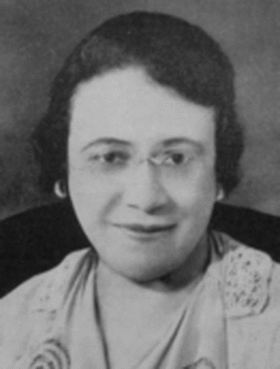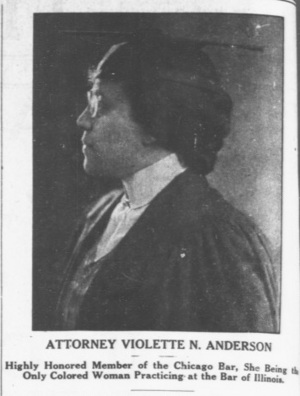Violette Neatley Anderson facts for kids
Quick facts for kids
Violette Neatley Anderson
|
|
|---|---|
 |
|
| Born | July 16, 1882 |
| Died | December 24, 1937 (aged 55) Chicago, Illinois, USA
|
| Nationality | American |
| Alma mater | Chicago Law School |
| Occupation | lawyer |
| Known for | First female African-American law school graduate in the state of Illinois First African-American woman to practice law at the United States Supreme Court. |
|
Notable work
|
Bankhead-Jones Act |
| Parent(s) | Richard and Marie Neatley |
Violette Neatley Anderson (July 16, 1882 – December 24, 1937) was a very important American lawyer. She made history on January 29, 1926, by becoming the first African-American woman allowed to argue cases in front of the United States Supreme Court. This is the highest court in the country. She also strongly supported a special law called the Bankhead-Jones Act. This law helped many farmers in the South get their own land.
Contents
Early Life and Family
Violette Neatley Anderson was born in London, England, in 1882. Her mother was German, and her father was from the West Indies. When she was a small child, her family moved to Chicago, Illinois, in the United States.
In 1903, Violette married her first husband, Albert Johnson. This marriage later ended. In December 1906, she married Dr. Daniel H. Anderson. She then took his last name, Anderson.
Education and Law Studies
Violette Anderson finished high school in Chicago in 1899. She went to Chicago Athenaeum for more studies. Her interest in law started when she worked as a court reporter. A court reporter writes down everything said in court. She did this job from 1905 to 1920.
Between 1912 and 1915, she attended Chicago Seminar of Sciences. Then, in 1920, she earned her law degree (called an LL.B.) from Chicago Law School. She was one of the first Black women to graduate from law school in Illinois.
A Trailblazing Legal Career
After graduating, Violette Anderson opened her own law office. She quickly became a leader in the legal field. From 1922 to 1923, she served as the first female City Prosecutor for Chicago. This meant she worked for the city to bring legal cases against people who broke the law.
On January 29, 1926, she achieved a huge milestone. She became the first Black woman allowed to practice law before the Supreme Court of the United States. This was a very big step for civil rights and equality.
Anderson also ran a court reporting business. She was an assistant prosecuting attorney. She also became the vice-president of the Cook County Bar Association from 1920 to 1926. This group supports lawyers in Cook County, Illinois.
She broke many barriers, including:
- Being the first African-American woman to pass the state board exam to become a lawyer in Illinois.
- Being the first African-American woman to have her own active law practice in Illinois.
- Being the first African-American woman allowed to practice in the United States District Court, Eastern Division of Illinois.
- Being the first African-American woman appointed as an assistant prosecuting attorney in Chicago.
- Being the first African-American Vice-president of the Cook County Bar Association.
Supporting the Bankhead-Jones Act
Violette Neatley Anderson played a key role in supporting the Bankhead–Jones Farm Tenant Act of 1937. She spoke in favor of the law and worked hard to convince the U.S. Congress to support it in 1936.
This Act was designed to help poor farmers. It offered low-interest loans to sharecroppers and tenant farmers. Sharecroppers were farmers who worked on land owned by others and paid with a share of their crops. The Act helped them buy their own small farms. President Franklin D. Roosevelt signed this important law in 1937.
Group Memberships and Community Work
Violette Anderson was active in many groups. She was a member of the Federal Colored Women's Clubs and the League of Women Voters. These groups worked for women's rights and community improvement.
She was also president of the Friendly Big Sisters League of Chicago. She served as the first vice-president of the Cook County Bar Association. She was also the secretary of the Idlewild Lot Owners Association. In addition, she was an executive board member of the Chicago Council of Social Agencies.
Zeta Phi Beta Sorority
Violette Anderson was very involved with the sorority Zeta Phi Beta. A sorority is a club for women, often in college, that focuses on friendship and community service. Before she became the 8th Grand Basileus (a top leader) of the sorority, she was a dedicated member.
Before she passed away, she generously donated her summer home in Idlewild to the sorority. To honor her, Zeta Phi Beta recognizes her every year in April on "Violette Anderson Day."
As the National President, Violette Anderson asked the Lambda Zeta chapter in 1937 to host a national convention in Houston, Texas. This was a very brave decision. No other Black Greek-lettered organization (like those in the Divine Nine) had ever held a national convention so far south, below the Mason-Dixon line.
The meeting was a big success. It was held in the Black business area of downtown Houston. Since there were no restaurants for Black people in downtown Houston at the time, meals were provided by the YWCA cafeteria. Violette Anderson also helped find places for many delegates and members to stay during the conference.
 | Madam C. J. Walker |
 | Janet Emerson Bashen |
 | Annie Turnbo Malone |
 | Maggie L. Walker |


